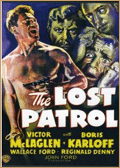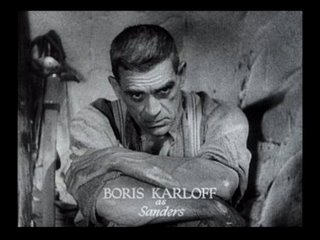
Wednesday, October 11, 2006
The Netflix queue was a bit out of chronological order for awhile, but you can stop worrying, it's fixed now.
After a run-through of Stagecoach (1939) and Fort Apache (1948), and a virgin screening of Drums Along the Mohawk (1939), I am back on track with The Lost Patrol (1934), which was originally meant to succeed my viewing of Ford's awkward themes and genre manipulation in the 1931 film, Arrowsmith.
Arrowsmith was boggling and The Lost Patrol was not a whole lot more coherent. Though, at least its scenery was consistent: A gang of army men wander the desert during the first World War, they are an organized team looking for food, water, and shelter from stray, almost imaginary bullets from an enemy that is rarely seen. A military patrol unit lost in the desert between warring lands, yes, the title says it, they are The Lost Patrol.
After the opening credit sequence, which does not behold its director title with the anticipation and stature that Ford's later films do (Fort Apache and The Searchers (1956), for instance), there is one neatly framed shot that foresees the kind of Fordian long shots through shadowed door or window frames, the crossed trunks of silhouetted palm trees that create a border for the wide, dry desert beyond. A few panoramas of the landscape are outright gorgeous as patches of shadow show the depth and distance of the space that consumes the soldiers.
Boris Karloff's character, Sanders, is the most awkward element, outside of the stilted dialogue scenes of soldiers reminiscing about home.

It's partially my own fault that Karloff sticks out so much, because all I can imagine is him grunting about in The Mummy (1932) and Bride of Frankenstein (1935). (Splendid movies, by the way.)
RKO Radio Pictures financed this one, and the next film up on my list, The Informer (1935). In the year between the two releases Ford pumped out three more pictures, two financed by Fox and one by Columbia. I don't know the significance of his history with the production companies, not yet anyway. So if you, dear reader, have any insight on that let me hear it.
No comments:
Post a Comment